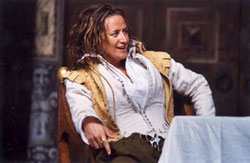DominionSections
Browse Articles
- IndependentMedia.ca
- MostlyWater.org
- Seven Oaks
- BASICS Newsletter
- Siafu
- Briarpatch Magazine
- The Leveller
- Groundwire
- Redwire Magazine
- Canadian Dimension
- CKDU News Collective
- Common Ground
- Shunpiking Magazine
- The Real News
- Our Times
- À babord !
- Blackfly Magazine
- Guerilla News Network
- The Other Side
- The Sunday Independent
- Vive le Canada
- Elements
- ACTivist Magazine
- The Tyee
- TML Daily
- New Socialist
- Relay (Socialist Project)
- Socialist Worker
- Socialist Action
- Rabble.ca
- Straight Goods
- Alternatives Journal
- This Magazine
- Dialogue Magazine
- Orato
- Rebel Youth
- NB Media Co-op
Radio
Paul Martin, Meet Shakespeare
September 27, 2003
Paul Martin, Meet Shakespeare

Janet McTeer as Petruchio in an all-female Globe Theatre production of The Taming of the Shrew. photo: John Tramper
Recently a friend suggested I check out Paul Martin's online opinion survey about the Canadian definition of marriage. Also recently I saw an all-female production of The Taming of the Shrew performed in that Shakespearian Mecca, London's Globe Theatre. And perhaps oddly, these two things have quite a lot to say to each other.
The Taming of the Shrew marked the first performance season of the theatre's new women's company, and the latest in a trend of single-sex Shakespearian productions. The play is an interesting option in this phenomenon because the story is actually about the do's and don'ts of gender behaviour (The "shrew" to be "tamed" is Katherina, a woman so irritable as to be "unmarriageable" until the swashbuckling Petruchio arrives to humiliate her into submission.) Gender-bending is hardly new to Shakespeare; many of his plots depend on it, and most audience members know that his original casts were all-male. So what happens when this notoriously chauvinist script is performed without any men on stage?
First, its machismo becomes immediately, inevitably satirized. Probably this is something of a relief to a contemporary audience, uneasily watching such a politically incorrect spectacle. Director Phyllida Lloyd took full advantage of this potential: Kathryn Hunter as Katherina, for example, made her final speech of submission gleefully over-the-top; the women cajoled into extending their palms for their husbands to tread upon did so, but sank to the ground due to laughter more than anything else.
But nowadays such "subversive" staging of the show has really become the norm. It was a surprise, then, that the Globe's same-sex production actually undermined any simple gender-equality message that might have been expected.
The actresses (particularly Janet McTeer, as Petruchio), offered a seriously sexy portrayal of swaggering machismo, to some surprise. The show's mixed messages built a more complex reality of desire than just plain political correctness might allow. Katherina really was smitten with the domineering Petruchio. On top of that, the audience got an additional erotic layer, as it seems two women kissing can still raise a bit of a buzz, even with one in male character.
Seeing women play out the contest for 'domination' or 'submission' made the story much more about power than gender, without any clear judgment on what power roles each gender "should" want. The same-sex casting also allowed another interpretation, in which gender disappeared completely; suddenly the deprivation of fine foods and clothing meant that Katherina might be learning not decorous womanly behaviour, but a little class consciousness instead.
And the relation to www.paulmartin.ca? Well, both art and politics are putting out ideas about the same thing; namely, they are imagining how people could identify and organize their experiences of attraction and devotion. Shakespeare's text is an inherited institution, as is the Canadian federal definition of terms of marriage. Director Phyllida Lloyd has made a centuries-old romantic comedy an articulate participant in any current debate about "defining" roles in marriage. Thankfully, the theatrical space is designed for just such imaginative representations. Creative interpretations of Canada's legal marriage scripts, such as bann-calling or commitment exchange ceremonies by same-sex couples, for example, have been a little less legal, but still enacted, to fit a more complex reality than our legal texts acknowledge. Both acts invite their witnesses to recognize or realize a not-so-straight reality. Which, if enough politicians (not to mention online survey respondents) go to the theatre... they too may be emboldened to produce.
Related articles:
By the same author:
Archived Site
The Dominion is a monthly paper published by an incipient network of independent journalists in Canada. It aims to provide accurate, critical coverage that is accountable to its readers and the subjects it tackles. Taking its name from Canada's official status as both a colony and a colonial force, the Dominion examines politics, culture and daily life with a view to understanding the exercise of power.